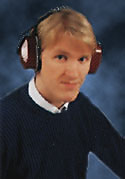If you
are a farmer, you are at risk for hearing loss caused by noise
exposure in your work. This can be seen as early as the teen
years. More commonly, symptoms appear in the 30s and 40s and
become more severe with time.
You
may have to strain to hear normal conversation. Background noise
at a social gathering, from a motor vehicle, or from machinery
will interfere with your ability to hear more than it will with
that of people who have normal hearing. You may find yourself
turning up the volume of the television or radio so loud that
others complain.Your hearing can be tested in the office of
your physician or by an audiologist in order to confirm that
there is a problem. This will help determine the cause. A visit
to a physician who is an otolaryngologist (ear, nose and throat
specialist) may be recommended.
We
all experience a decrease in hearing with aging, which usually
becomes apparent after age 50. Ear infections, seen most often
in small children, can lead to hearing loss. If the noise is
loud enough to prevent a conversation, it may be damaging your
hearing.
- In
farmers, exposure to noise from machinery is an important
cause for hearing loss.
- Tractors,
grinders, augers, and other machinery contribute to this
problem.
- The
noise from lawn mowers and chain saws can be harmful.
- Episodic,
very loud sounds such as those generated by guns and by
pigs squealing can damage hearing.
- Listening
to loud music may also be a factor.
- Having
the ear canal obstructed by ear wax can temporarily decrease
hearing.
- A
head injury may damage hearing.
- Rare
causes of hearing loss include tumors, exposure to toxic
medicines and inherited conditions.
Hearing
aids can improve the hearing of those suffering from noise induced
hearing loss. However, preventing the problem is the best approach
to take.
Cabs
on tractors can decrease the noise level to the safe range.
Wearing hearing protectors, consisting of ear plugs or muffs,
helps preserve hearing.
 |
 |
| Ear
muffs |
Ear
plugs |
This
document was produced by the Nebraska Rural Health and Safety
Coalition. Funded in part by a grant from the W.K. Kellogg
Foundation.
Nebraska
Rural Health and Safety Coalition, University of Nebraska Medical
Center, 600 South 42nd Street, Omaha, Nebraska 68198-5300. Phone:
(402) 559-7397. FAX: (402) 559-8210.
Disclaimer and Reproduction Information: Information in
NASD does not represent NIOSH policy. Information included in
NASD appears by permission of the author and/or copyright holder.
More

